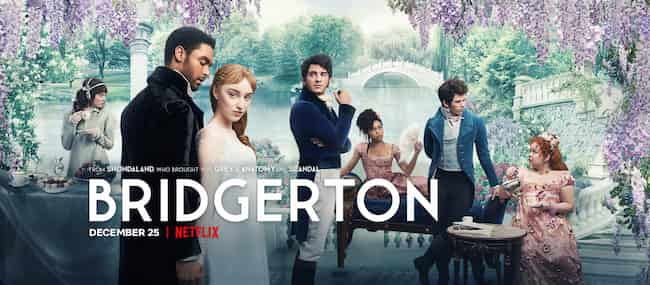We analyze everything that has changed in history, from Julia Quinn’s novels to their Netflix adaptation.
Mixing the London elite’s marriage dramas of the early 19th century and a modern tone that fits from sex scenes to string versions of songs by Ariana Grande and Billie Eilish, ‘The Bridgertons’ stands as a romantic comedy. As anachronistic as it is charming. The Netflix series has had a great reception among viewers, who have fallen prey this Christmas time of its torrid romances, its duels at dawn, and its ‘Austenian’ essence.
The Bridgerton family’s story began on paper in the successful series of books written by Julia Quinn. They are based on the series created by Chris Van Dusen under the label of Shondaland (the producer of Shonda Rhimes ), which will follow the same structure: each season is based on a book, and each book focuses on one of the brothers and sisters.
Of the family. The first season follows ‘The Duke and I’ starring Daphne Bridgerton ( Phoebe Dynevor ). Still, fans of Quinn’s novels will have been surprised to see that this adaptation changes a lot from the original material.
From paper to the small screen, ‘The Bridgertons’ has undergone many changes. We analyze them here, from those characters that have appeared out of nowhere or that have suddenly gained more prominence than they had, to certain moments that have softened in their jump to images. Hold on to your cup of tea because we’re going to drop all the T.
A London free of racism:
As many will have deduced, it is not true that the London of 1813 was so diverse and free of racism. There are no explicit mentions of the protagonists’ skin color in Julia Quinn’s books. Hence, creator Chris Van Dusen, along with Shonda Rhimes, just needed an excuse to unleash their elite British’s diverse society, and they found her in Queen Charlotte.
A theory was not completely confirmed among historians that the monarch at that time, King George III’s wife, had African ancestors.

The series accepts this fact as true and takes it to its ultimate consequences: they invent a new situation in which the queen decides to use her position of power and influence to offer titles and lands to various black families in the country, including the Duchy of Hastings to the father of Simon Basset (Rege-Jean Page).
But this whole situation is exclusive to the Netflix series: in the books, the character played by Golda Rosheuvel was not featured at all, and the black characters in the series, such as Lady Danbury (Adjoa Andoh), were not specified as such, per what can not really be spoken of a change between both stories, but of an interpretation.


